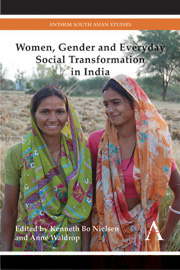Book contents
- Frontmatter
- Contents
- Acknowledgments
- Women and Gender in a Changing India
- PART I WORK, TECHNOLOGY, ASPIRATIONS
- PART II DEMOCRACY AND THE DEVELOPMENTAL STATE
- PART III ASSERTIONS AND ACTIVISM
- Chapter Eleven New Subalterns? Feminist Activism in an Era of Neoliberal Development
- Chapter Twelve Family, Femininity, Feminism: ‘Structures of Feeling’ in the Articulation of Men's Rights
- Chapter Thirteen Women's Activism in the Singur Movement, West Bengal
- Chapter Fourteen The Women's Question and Indian Maoism
- Chapter Fifteen Caste and Class in Gendered Religion: Dalit Women in Chennai's Slums
- About the Editors and Contributors
Chapter Fourteen - The Women's Question and Indian Maoism
from PART III - ASSERTIONS AND ACTIVISM
Published online by Cambridge University Press: 05 October 2014
- Frontmatter
- Contents
- Acknowledgments
- Women and Gender in a Changing India
- PART I WORK, TECHNOLOGY, ASPIRATIONS
- PART II DEMOCRACY AND THE DEVELOPMENTAL STATE
- PART III ASSERTIONS AND ACTIVISM
- Chapter Eleven New Subalterns? Feminist Activism in an Era of Neoliberal Development
- Chapter Twelve Family, Femininity, Feminism: ‘Structures of Feeling’ in the Articulation of Men's Rights
- Chapter Thirteen Women's Activism in the Singur Movement, West Bengal
- Chapter Fourteen The Women's Question and Indian Maoism
- Chapter Fifteen Caste and Class in Gendered Religion: Dalit Women in Chennai's Slums
- About the Editors and Contributors
Summary
Without unleashing the fury of women as a mighty force of revolution, victory in revolution is impossible. Hence, the mobilization of toiling women in the revolutionary people's war against imperialism and feudalism is a must. The equality between men and women can be realized mainly in the course of the revolutionary war and then further in the process of socialist transformation of society as a whole. (CPI(Maoist) 2004a, 52)
Women form one of the target groups for Maoist mobilization in India today. The movement is said to attract a large number of women, especially rural poor and tribal women. The Maoist agenda for larger socioeconomic transformations also includes the goal of women's equality and emancipation. Through the people's war, the Maoists in India today, who declare their ideology as Marxism–Leninism–Maoism, seek to usher in a ‘New Democratic Revolution’, which they believe will also alter existing unequal gender relations.
While the women's question usually forms an important part of the Marxist revolutionary agenda, it is seen as resolvable through class struggle itself. Frederick Engels (1884) was perhaps the first to elaborate on women's oppression. For him, the origins of patriarchy lay in the formation of class society. Consequently, its solution lay in the struggle against capitalism. The women's question within Marxism has always been a source of considerable debate.
- Type
- Chapter
- Information
- Women, Gender and Everyday Social Transformation in IndiaA Revisionary History, pp. 219 - 234Publisher: Anthem PressPrint publication year: 2014



